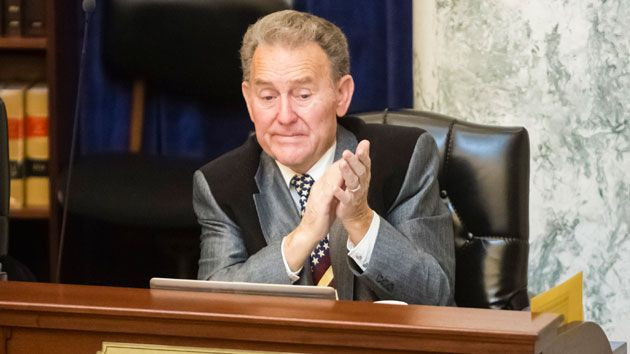Idaho Representive Believes Incest, Rape Victims Are 'Less Likely' To Get Pregnant

It seems Republican lawmakers can’t help but pretend to be obstetricians when given the opportunity, even if their medical knowledge would make the likes of Dr. Doom cringe at their collective ineptitude.
Last Thursday, The Spokesman-Review captured a particularly frustrating exchange during a legislative hearing on an Idaho bill that would require abortion providers to hand out a list of locations where their patient could obtain a free ultrasound prior to the procedure, as well as be told they have the right to obtain a ultrasound and to hear a fetal heartbeat. These ostensibly good-natured proposals have long been criticized by pro-choice advocates as a means of manipulating women into visiting crisis pregnancy centers known to be staffed by anti-abortion employees who often spread debunked myths about the dangers of abortion.
At one point, Rep. Pete Nielsen (R) stepped forward to question one of these employees, Angela Dwyer of Stanton Healthcare, taking upon himself to defend the decision not to exclude rape and incest survivors from the bill’s requirements. “Now, I’m of the understanding that in many cases of rape it does not involve any pregnancy because of the trauma of the incident. That may be true with incest a little bit,” he said to Dwyer.
After the hearing, according to The Spokesman-Review, he stuck to his guns, asserting that pregnancy following rape “doesn’t happen as often as it does with consensual sex, because of the trauma involved.”
When questioned on the source of his knowledge, he replied, “That’s information that I’ve had through the years. Whether it’s totally accurate or not, I don’t know.” To close out his impromptu gynecological consultation, he added that his experience being the father of five girls made him particularly motivated to explore the issue “a lot.”
Nielsen’s comments can’t help but bring to mind the equally wrongheaded utterings made by fellow and former House Representative Todd Akin (R-Miss) in 2012, when Akin remarked that in cases of “legitimate rape, the female body has ways to try to shut that whole thing down.” The resulting controversy following Akin’s comments is widely believed to have helped prevent his election to the U.S Senate later that year.
While not quite as egregiously offensive as Akin’s, Nielsen’s argument relies on the same premise, a premise that received a thorough thrashing from many corners of the medical world last time around.
In a 2000 study published in the American Journal of Preventive Medicine, researchers estimated “that the 333,000 sexual assaults and rapes reported in 1998, along with many more unreported, were responsible for 25,000 pregnancies.” They further concluded 22,000 pregnancies could have been prevented by “prompt medical services,” including emergency contraception.
For many reasons, including underreporting, it’s difficult to settle on a definitive number of rapes and sexual assaults committed against women annually, but it’s generally believed pregnancy occurs 5 percent of the time in these cases, a figure roughly in line with the risk of pregnancy following a consensual act of intercourse. At least one study in 2003 found a slightly higher number at 6.4 percent, while other studies have found lower rates.
Admittedly, while we do know that women can and do indeed get pregnant from rape, there hasn’t been much research in the area in recent years, while incest remains particularly impossible to study.
None of which is to say that Nielsen’s musings carry any merit. In fact, he was even debunked by the seemingly Nielsen-friendly Dwyer, who replied to his statement by recounting the story of two rape survivors who sought out her services due to their pregnancies (both chose to continue their pregnancy, while one opted for adoption). Elsewhere in the world, girls as young as ten have repeatedly been denied the opportunity to seek abortion following sexual assault.
As the bill itself, it received majority approval from the Idaho House State Affairs Committee, with the only dissent coming from the committee’s four Democrats. As such, it will continue along to the full House for a vote.



























